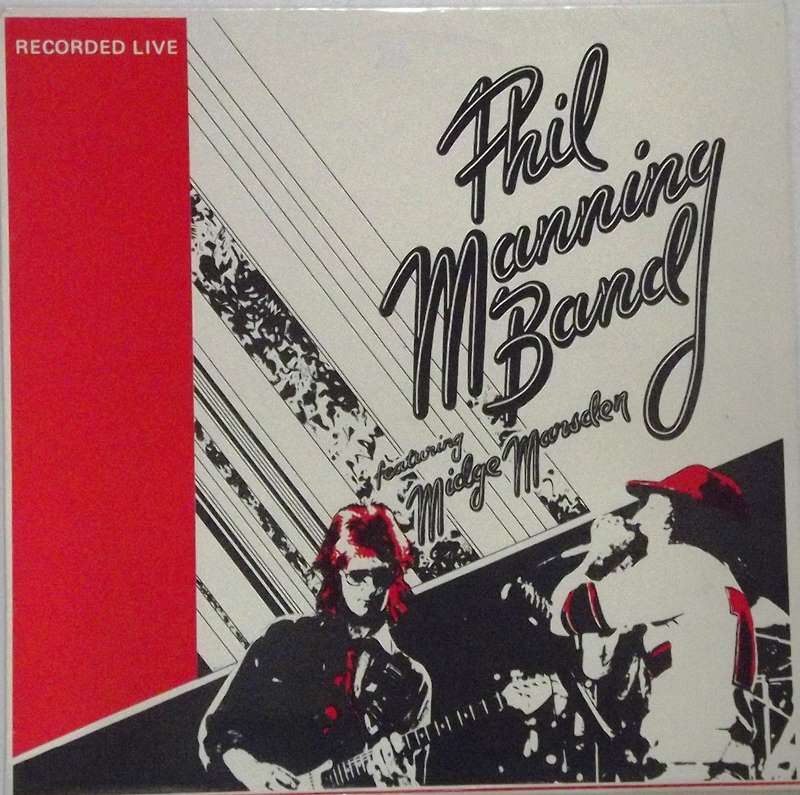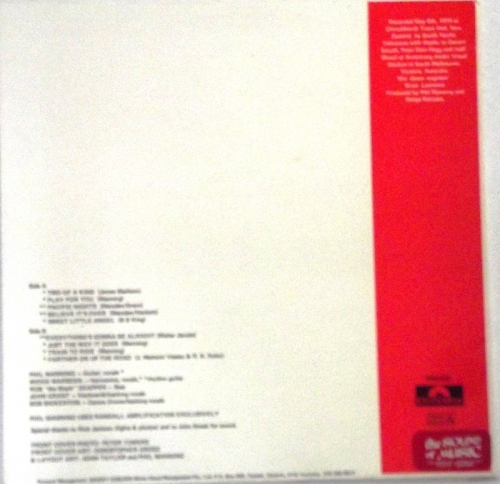

| Product Code: | PMB 008 |
| Artist: | Phil Manning Band Featuring Midge Marsden |
| Origin: | New Zealand |
| Label: | Polydor (1979) |
| Format: | LP |
| Availability: | Enquire Now |
| Condition: |
Cover: VG+
Record: VG+
|
| Genre: | U |
Very rare smart clean vinyl with a gloss cover.
Philip John "Phil" Manning (born 1948) is an Australian blues singer-songwriter and guitarist. Manning has been a member of various groups including Chain and has had a solo career. As a member of Chain, Manning co-wrote their January 1971 single "Black and Blue" which became number one on the Melbourne charts and also Judgement, which reached number two in Sydney. The related album, Toward the Blues followed in September and peaked in the top 10 albums chart.[1][2]
Manning left Chain in July 1971 to work with Warren Morgan (ex-Chain, Billy Thorpe & the Aztecs) on keyboards in a band called Pilgrimage. They issued a single, "Walk in the Light" in November and supported United Kingdom progressive rock group, Pink Floyd, in September and pop artist, Elton John, in October.[3] He briefly returned to Chain from November for three months before joining Leo de Castro's Friends.[3] In April 1972, Manning formed Willy & the Philtones which was renamed Band of Talabene in July with Tony Buettel on drums, Phil Gaunt on bass guitar and Tony Naylor on guitar.[3][6] In December he joined Mighty Mouse which at various times included Harvey, Sullivan, Ian Clyne on keyboards, and Mal Capewell on sax and flute.[6] By February 1973, Mighty Mouse was renamed as Chain (their 15th line-up) and Manning left by July 1974.[3]
In December 1974, Manning released his debut solo album, I Wish There Was a Way, on Mushroom Records and Festival Records. Australian music historian, Ian McFarlane, described the album as in a "mellow, reflective singer/songwriter mode".[3] The album spawned two singles, "Love Is the Mender" in December and "I Wish There Was a Way" in March 1975.[3] In May, he formed the Phil Manning Band with Greg Cook on guitar and synthesiser (ex-Cam-Pact, Mándu Band), Bruce Devenish on drums and Eddie McDonald on bass guitar (ex-Bakery).[3] They recorded the pop single "Train to Ride" which was issued in October. However, in September the line-up had changed to Steve Cooney on guitar, Tony Doyle on drums and Paul Wheeler on bass guitar (ex-Billy Thorpe and the Aztecs, MacKenzie Theory).[3] The group disbanded in March 1977 and Manning joined John Paul Young's backing band the Allstars for three months.[3]
In July 1977 he formed Manning Keays Band with Jim Keays on vocals (ex-The Masters Apprentices) and Peter Cuddihy on bass guitar (ex-Space Waltz), John Grant on keyboards (ex-Freeway), Andrew Kay on violin and keyboards, and Robert Ross on drums.[3] When Keays left later in the year, the soul pop group was renamed as Manning and released a self-titled album in May 1978. Manning provided the singles "When a Man Loves a Woman" (a Percy Sledge cover) in December 1977 and "Call Me" in April 1978.[3] In July a new line-up of Phil Manning Band was Cuddihy, Grant, John J Hackett on drums (ex-Rum Jungle) and Midge Marsden on guitar. His brother, Dennis, briefly joined on keyboards and in May 1979 they issued the single, "Just the Way It Goes". Dennis had left, Robbie Geapon replaced Cuddihy on bass guitar and Bob Bickerton (ex- Mándu Band) replaced Hackett on drums to record an album, Live on Polydor Records, for New Zealand release only, in 1979.[3]
The Matt Taylor Phil Manning Band was formed in Perth in late 1980 with his former Chain bandmate. The group included Roy Daniel on bass guitar and Ric Whittle on drums and recorded an album, Oz Blues and a single "Spring Hill" both issued in June 1981. This group disbanded by December and a new line-up of Phil Manning Band was formed with Chris Copping on keyboards (ex-Procol Harum), Kerryn Tolhurst on guitar (ex-The Dingoes), and Wayne Duncan on bass guitar and Gary Young on drums (both ex-Daddy Cool). Copping was replaced by Mick O'Connor on keyboards. By 1983, with only Duncan and Young remaining, they became the Phil Manning Trio.[3] In December he reformed Chain with Taylor and remained in the group until 1986.[3]